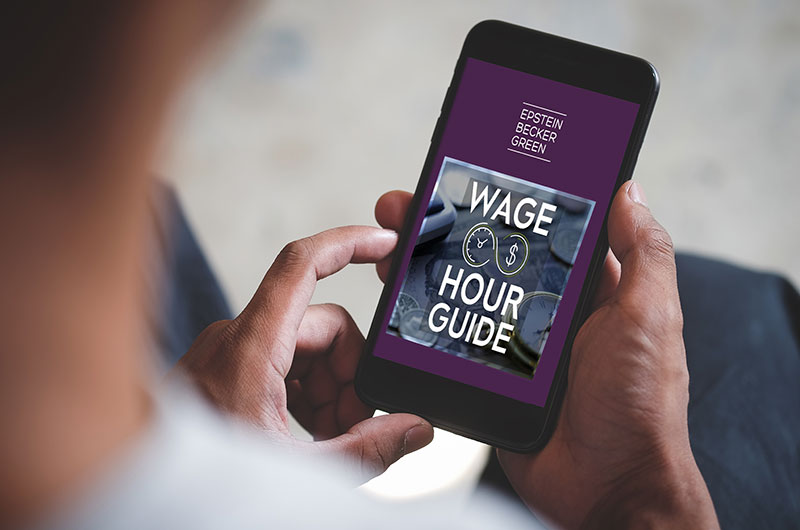As we previously reported, the U.S. Department of Labor (DOL) issued a new final rule increasing the minimum salary amounts for the executive, administrative, and professional (EAP) and highly compensated employee exemptions.
Shortly after the DOL announced its final rule, three lawsuits were filed in federal district courts in Texas challenging the DOL’s authority to increase the salary thresholds. However, despite these challenges, the first increase took effect on July 1, 2024 for all employers, except for the State of Texas as an employer.
State of Texas v. DOL
On May 22, 2024, a group of national business associations filed a complaint in the United States District Court for the Eastern District of Texas against the DOL challenging the final rule.[1] This lawsuit was later consolidated with a complaint filed in the same court by the State of Texas similarly challenging the final rule.[2] Notably, the consolidated action alleges that the final rule exceeds the DOL’s statutory authority under the Fair Labor Standards Act (FLSA) and the Administrative Procedure Act (APA), and that the final rule is arbitrary and capricious, in violation of the APA.
Only two days before the first increase was set to take effect, the court granted the State of Texas’s preliminary injunction restraining the DOL from enforcing the rule, but only as the rule applies to the State of Texas as an employer. The court determined that the State of Texas is likely to succeed on the merits of its claim because the DOL’s regulatory power regarding the EAP exemptions is limited to duties and not salaries. In fact, the court relied upon the Supreme Court of the United States’s decision in Loper Bright Enterprises v. Raimondo, issued only hours before, overruling the Chevron deference doctrine. The Chevron doctrine, which instructed the courts to afford a high degree of deference to federal agencies when interpreting ambiguous statutes, was applied by the courts after hearing challenges to the DOL’s prior attempts to increase the salary thresholds in both 2016 and 2019 and was a significant factor in the 2019 holding that the DOL had the authority to set salary thresholds.[3]
Relying on its new ability to independently review the DOL’s statutory authority, the Eastern District of Texas temporarily enjoined enforcement of the DOL’s 2024 final rule (albeit in a very limited scope), holding that it is likely not based on a fair construction of the FLSA. One of the court’s primary concerns appeared to be that the new salary threshold requirement for EAP exemptions effectively eliminates an inquiry into the duties the employee performs, which is the inquiry the FLSA expressly requires for the EAP exemptions.
Flint Avenue LLC v. DOL
Similarly, a small software development company of seven employees filed suit in the United States District Court for the Northern District of Texas challenging the final rule.[4] However, on July 1, 2024, the court denied the company’s Motion for Stay or Preliminary Injunction determining that the company was unable to show irreparable harm sufficient to warrant injunctive relief where only one employee was possibly affected by the July 1 minimum salary increase. The court also refused to grant a nationwide injunction for the second increase set to take effect on January 1, 2025—although at least four employees would be affected by this increase—because the court is expected to reach a decision on the merits before then.
As such, a nationwide injunction was not granted before the July 1 increase took effect. Meaning that for all employers (except the State of Texas), the new salary threshold of $844 per week ($43,888 per year) for the EAP exemptions and $132,964 per year for the highly compensated employee exemption that took effect on July 1 remains in effect. The January 1 increase is also set to take effect pending the outcomes of the challenges discussed above.
Takeaways for Employers
At least for now, the final rule is in effect for all employers other than the State of Texas. To the extent they have not done so already, employers should determine which employees are affected by the first increase prescribed by the final rule and implement modifications as needed (i.e., by increasing salaries or reclassifying employees as non-exempt and eligible for overtime). While it is unclear whether the final rule will ultimately be enjoined on a nationwide basis, employers should consider additional modifications that may be needed to comply with the January 1 increase. Employers should also remain informed on the different challenges to the final rule given the changing legal environment in this space.
Adam Loch, a Summer Associate (not admitted to the practice of law) in Epstein Becker Green's New York office, contributed to the preparation of this blog post.
ENDNOTES
[1] Plano Chamber of Com. v. Su, U.S.D.C. E.D. of Texas Sherman Div., Case No.: 4:24-cv-00468.
[2] Texas v. U.S. Dep’t of Lab., U.S.D.C. E.D. of Texas Sherman Div., Case No.: 4:24-cv-00499.
[3] See Mayfield v. U.S. Dep’t of Lab., No. 1:22-cv-792-RP, 2023 WL 6168251 (W.D. Tex. Sept. 20, 2023), appeal docketed, No. 23-50724 (5th Cir. 2023).
[4] Flint Ave. LLC v. U.S. Dep’t of Lab., U.S.D.C. N.D. of Tex. Lubbock Div., Case No.: 5:24-cv-130.
Download Epstein Becker Green’s Wage & Hour Guide for Employers App  |
 |
Blog Editors
Authors
- Associate
